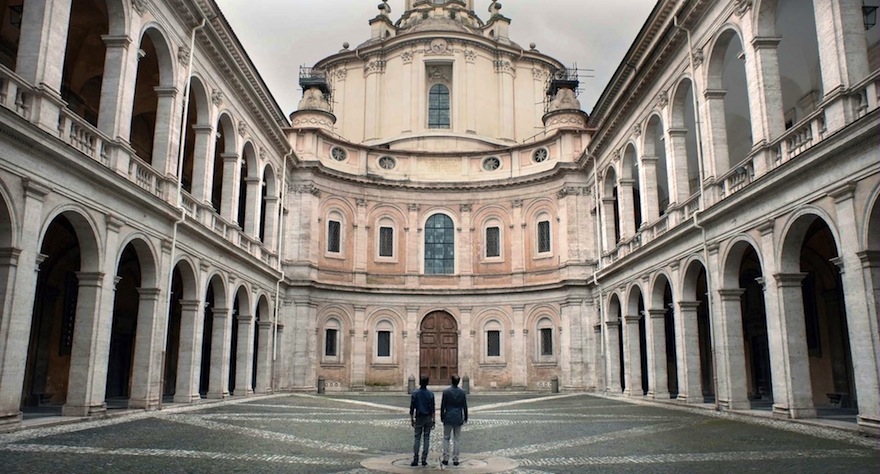
Eugéne Green's loving ode to Baroque architecture feels stilted and awkward even as it's beautiful.

Eugéne Green's loving ode to Baroque architecture feels stilted and awkward even as it's beautiful.
The kind of funny thing about overlapping dialog is you don’t quite realize it’s there until it’s suddenly not. The typical cadences of interaction are abandoned in favor of a more stilted, expressive manner of speech in La Sapienza. It’s the newest film from American-born but French-naturalized Eugéne Green (and his first since 2009’s The Portuguese Nun). La Sapienza serves as the filmmaker’s love letter to 17th century architecture, and the work of Italian architect Francesco Borromini. Green frames this homage through the martial difficulties of a modern couple, Alexandre and Alienor Schmidt (played by Fabrizio Rongione and Christelle Prot Landman, respectively).
Alexandre is an architect as well, one who touts the factories he’s helped design as modern-day churches. At the film’s onset, he’s receiving a lifetime achievement award. Meanwhile Alienor works as a psychoanalyst, conducting studies of cultures on a macro-scale. Their outer successes would seemingly indicate a happy marriage; however, the couples’ awkward dinner date and stiff communications indicate otherwise. Alexandre decides to travel to Italy in hopes of completing his long-gestating book on Borromini, and informs Alienor as if it were an announcement.
Green has Rongione and Landman often speaking to one another but facing outward, as if cheating their posture toward an unseen theater audience. This technique can make these exchanges appear uncomfortably sincere, but the effect also highlights each line of dialog, nearly all of which contains a precisely articulated feeling from one of the film’s characters. Green seems intent on allowing unfiltered expressions of a dissolving marriage provide the context for La Sapeinza’s narrative thrust, regardless of how rigid that approach feels in moments of the film. Sometimes it feels like we’re just waiting for the next character to speak.
The couple arrives in Italy and quickly meets a pair of siblings—Goffredo and Lavinia (Ludovico Succio and Arianna Nastro)—just as Lavinia is struck by one of her infrequent dizzy spells. Without deliberation, Alexandre and Alienor help their new, young friends catch a taxi back home to help Lavinia rest, then take Goffredo out to lunch only to learn he soon plans on beginning his studies as an architect. This chance encounter gives Alienor an idea: she will stay in Stresa while Lavinia recuperates and Goffredo will accompany Alexandre to learn about architecture. By this point, it’s clear the married couple hasn’t been enjoying their time together, yet this suggestion still feels hasty.
Giving over to the exploration of fleeting love and Baroque architecture in La Sapienza might elicit a thoughtful response in some; however, the narrative imposed on the movie is jarringly blatant, with subtext delivered as text. Where La Sapienza seems primarily concerned is in its explanations of the life of Borromini, matched with artfully framed shots of his work. The church façades and intricately crafted vaults are discussed while Green’s camera slowly pans across the design, occasionally making a full 360-degree spin around the ceilings of particular churches. This studying of Borromini’s work takes Alexandre and Goffredo to the Church of Saint Yves at La Sapienza in Rome that gives Green’s film its title. The beauty is undeniable, but it seems obvious from the film’s preoccupancy with Borromini that Eugéne Green simply finds 17th Century architecture much more fascinating than the average filmgoer (or myself at least).
Perhaps the most compelling sequence among a slew of dialog-heavy exchanges comes during a bout of Alexandre’s insomnia when he’s decided to work on his Borromini book. As we see close-ups of Borromini’s work, as well as a vignette of his final night, Alexandre speaks in voice-over the words he plans to include in his book. When the sequence intersperses shots of Alexandre in bed, it becomes clear that the scene is meant to illustrate his writing process, a process that often appears uncinematic in movies. With La Sapienza, Green manages to articulate the struggle to put words to the page without simply showing Alexandre slouching over a laptop.
Ultimately, the blending of past with present does little to inform either. Eugéne Green’s ode to the legacy of Francesco Borromini is able to beautifully capture the architect’s iconic constructions, yet it’s unfavorably matched with a non-engaging narrative. It’s intriguing to see Rongione and Landman navigate such odd conversations, and both deliver fine performances (stronger ones than their younger counterparts), but there is so much empty space within the margins of La Sapienza that your attention is drawn to the voids rather than the substance.